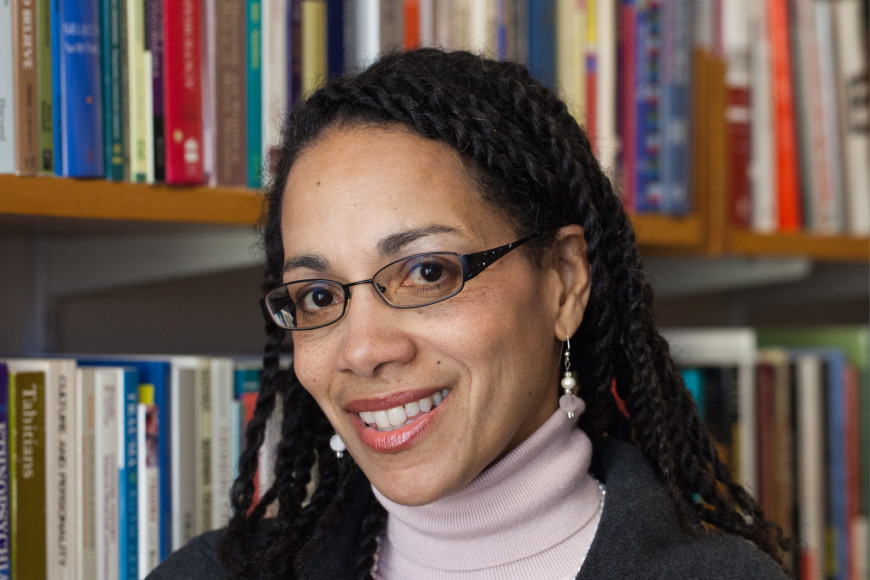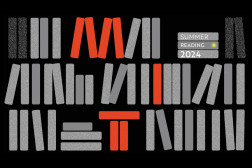Biography
Erica James is the Professor of Medical Anthropology and Urban Studies. Her work is focused on violence and trauma; philanthropy, humanitarianism, and charity; human rights, democratization, and postconflict transitions; race, gender, and culture; religion and healing, and climate change and food (in)security, especially for Haiti's cocoa farmers. Her pronouns are she, her, and hers.
Prof. Erica (as she prefers to be called in class) has an award winning first book, Democratic Insecurities: Violence, Trauma, and Intervention in Haiti, that documents the psychosocial experience of Haitian torture survivors targeted during the 1991-94 coup period. The ethnography analyzes the politics of humanitarian assistance in "post-conflict" nations making the transition to democracy and is based on her physical therapy with and accompaniment of survivors as they sought rehabilitation and reparations. This work demonstrates how postconflict transitions and political development assistance to redress democratic crises must integrate justice oriented psychosocial interventions in order to be efficacious.
Her second ethnographic book, Life at the Center: Haitians and Corporate Catholicism in Boston, analyzes the "biopolitics of charity" at a faith-based organization serving Haitian immigrants and refugees that receives federal, state, municipal, and private grant funding through Catholic Charities. The project was supported by the NIH Health Disparities Research Program.
Her third book, the edited volume Governing Gifts: Faith, Charity, and the Security State, expands this focus on the politics of charity with additional contributions from scholars tracing the impact of U.S. anti-terrorism financing laws and practices on both faith-based and secular NGOs working in the United States and globally.
Prof. Erica has two book-length manuscripts in progress: the first, The Matter of Black Lives: Race, History, and the Politics of Infrastructure in the American South, is an environmental justice autoethnography. The work documents her advocacy in Charlottesville, Virginia between 2013 and 2016 to protect historic African American properties threatened by a federally funded highway project. The project depicts fraught and ongoing struggles over race, identity and heritage, and history, its commemoration, and memorialization, in the built environment.
The second, Cocoa, Commodities, and Climate in Haiti, based on ethnographic research conducted in Haiti, France, England, Germany, Canada, and the US between 2016 and 2022, analyzes the role of USAID-funded projects to improve the yields of Haiti's smallholder cacao farmers. These producers struggle to develop and export their commodities to large and small batch international chocolate makers despite challenging domestic political and environmental climates.
Research
In my work I have focused on violence and trauma; philanthropy, humanitarianism, and charity; human rights, democratization, and postconflict transition processes; race, gender, and culture; and religion and healing. My first book, Democratic Insecurities: Violence, Trauma, and Intervention in Haiti (University of California Press 2010), documents the psychosocial experience of Haitian torture survivors targeted during the 1991-94 coup period and analyzes the politics of humanitarian assistance in "post-conflict" nations making the transition to democracy. The research was supported by a Social Science Research Council-MacArthur Foundation Fellowship on Peace and Security in a Changing World (1998-2000) and NIMH pre- and post-doctoral fellowships. My second major book project, entitled The Church, the Charity, and the Center: Corporate Catholicism in the Archdiocese of Boston, analyzes the "biopolitics of charity" at a "faith-based" organization serving Haitian immigrants and refugees that is funded through Catholic Charities. The project was supported by funding from the NIH Health Disparities Research Program. My third project, Governing Gifts: Law, Risk, and the "War on Terror", continues this focus on the politics of charity by tracing the impact of U.S. anti-terrorism financing laws and practices on both faith-based and secular NGOs in the United States.
Selected Publications
| 2015 | "If you remember, you can't live": Trauma, Insecurity, and the F/utility of "PTSD" in Haiti. In An Anthropology of Living and Dying in the Contemporary World, edited by Veena Das and Clara Han, Pp. 301-315, 2015, University of California Press. |
| 2015 | Culture, Trauma, and the Social Life of "PTSD" in Haiti. In Culture and PTSD, editors Devenon Hinton and Byron Good, Pp. 359-386, 2015, University of Pennsylvania Press. |
| 2012 | Witchcraft, Bureaucraft, and the Social Life of (US)AID in Haiti. Cultural Anthropology, Vol. 27, no. 1 (2012): 50-75. |
| 2011 | Haiti, Insecurity, and the Politics of Asylum. Medical Anthropology Quarterly, Vol. 25, no. 3 (2011): 357-376. |
| 2011 | Governing Gifts: Law, Risk, and the "War on Terror."UCLA Journal of Islamic and Near Eastern Law, Vol. 10, no. 1 (2010-2011): 65-84. |
| 2010 | Ruptures, Rights, and Repair: The Politics of Truth in Haiti. Social Science & Medicine, Special Issue on "Conflict, Violence, and Health," Vol. 70, no. 1 (2010): 106-113. |
| 2010 | Democratic Insecurities: Violence, Trauma, and Intervention in Haiti. California Series in Public Anthropology, University of California Press, 2010. |
| 2008 | Haunting Ghosts: Madness, Gender, and Ensekirite in Haiti in the Democratic Era. In Postcolonial Disorders, edited by Mary-Jo DelVecchio Good, Sandra Hyde, and Byron Good, Pp. 132-156, 2008. University of California Press. |
| 2004 | The Political Economy of 'Trauma' in Haiti in the Democratic Era of Insecurity. Culture, Medicine and Psychiatry, Vol. 28, no. 2 (2004): 127-149. |
Teaching
21A.308
Global Mental Health
Provides skills to critically analyze issues of mental health in historical and cross-cultural contexts. Studies mental illness as a complex biopsychosocial experience embedded in particular political and economic frameworks. Examines the relationships among culture, gender, embodiment, and emotional distress; power inequalities and ideas of the "normal" and "abnormal;" and how such conceptions influence caregiving practices, whether in traditional or biomedical contexts. Evaluates how the disciplines of psychology, psychoanalysis, and psychiatry have developed in the West, and considers their influence on mental health interventions in global settings.
21A.331J/7.331J/HST.431J
Infections and Inequalities: Interdisciplinary Perspectives on Global Health
Examines case studies in infectious disease outbreaks to demonstrate how human health is a product of multiple determinants, such as biology, sociocultural and historical factors, politics, economic processes, and the environment. Analyzes how structural inequalities render certain populations vulnerable to illness and explores the moral and ethical dimensions of public health and clinical interventions to promote health.
21A.302J / WGS.271J
Dilemmas in Biomedical Ethics: Playing God or Doing Good?
Bio-medical researchers, physicians, and other health practitioners across the globe are constantly faced with the ethical challenges that new medical technologies provide. These technologies promote the health of individuals, and can protect and extend life. New biotechnologies force us to reconsider our notions of relatedness and the "naturalness" of the body. Many of these techniques raise questions about how we conceive life, personhood, and embodiment; sexuality, morality, and ethics; race and ethnicity; and kinship and gender in cross-cultural contexts. As these technologies travel across borders, they are interpreted and incorporated into existing sets of historical, political, and economic relations of power between nations, institutions, families, and individuals. At the same time, limited resources, worldwide disparities in access to care, and other moral constraints force researchers, doctors, and patients to make choices about the care that is sought and provided. This course will explore the way in which culture, religion, politics, and economics are among some of the factors affecting the politics of abortion, contraception, organ transplantation, cloning, the availability of pharmaceuticals, end of life care, and others. These cases reveal the day-to-day ethical dilemmas in medical research and healing practices.
21A.306
Culture, Embodiment, and the Senses
Culture, Embodiment, and the Senses will provide an historical and cross-cultural analysis of the politics of sensory experience. The subject will address western philosophical debates about mind, brain, emotion, and the body and the historical value placed upon sight, reason, and rationality, versus smell, taste, and touch as acceptable modes of knowing and knowledge production. We will assess cultural traditions that challenge scientific interpretations of experience arising from western philosophical and physiological models. The class will examine how sensory experience lies beyond the realm of individual physiological or psychological responses and occurs within a culturally elaborated field of social relations. Finally, we will debate how discourse about the senses is a product of particular modes of knowledge production that are themselves contested fields of power relations.
21A.300
Practicum in Global Health and Development
This subject trains students to analyze critically the relationships between "health" and "development" in global contexts and to conduct ethnographic research on these topics. In the first part of the course, students are introduced to the theory and methods of medical anthropology, social medicine, public health, and development, with particular attention to ethical issues around human subjects research. Using case studies, we track how culture, history, and political economy influence health and disease in communities and why health and development initiatives have succeeded (or failed). Our aim is to understand how to "do good" and "do well," while recognizing that there may be unintended consequences to any intervention. In the second part of the class, students work in teams to formulate research questions, and collect and analyze qualitative data on health-related topics in the greater Boston area. The goal of the joint project is to propose interventions aimed at improving health and development both in the U.S. and abroad.
21A.203
Anthropology through Speculative Fiction
Examines how anthropology and speculative fiction (SF) each explore ideas about culture and society, technology, morality, and life in "other" worlds. Investigates this convergence of interest through analysis of SF in print, film, and other media. Covers traditional and contemporary anthropological topics, including first contact; gift exchange; gender, marriage, and kinship; law, morality, and cultural relativism; religion; race and embodiment; politics, violence, and war; medicine, healing, and consciousness; technology and environment. Thematic questions addressed in the class include: what is an alien? What is "the human"? Could SF be possible without anthropology?
21A. 409J / 11.238J
Ethics of Intervention
This subject is an historical and cross-cultural study of the logics and practices of intervention: the ways that individuals, institutions, and governments identify conditions of need or "states of emergency" within and across borders that require a response. The class will analyze the technologies and practices of intervention as modes of ordering, transforming, or governing the 'targets' of intercession – whether these targets are individual subjects, communities, infrastructures, or geographical environments. The course reviews theories of the state, globalization, and humanitarianism; power, policy, and institutions; gender, race, and ethnicity; and law, ethics, and morality. Students assess the ethical underpinnings of action and inaction in a variety of contexts that are increasingly visible and have long historical roots: colonial slavery and imperialist endeavors; missionaries and religious charitable work; human rights and refugee crises; war as military and humanitarian intervention; democracy promotion as 'prevention'; disaster response and environmental protection; epidemics, medical missions, and public health, among others. Participants will ask the following questions: When is a response viewed as obligatory, when is it deemed unnecessary, and by whom? When is the intercession considered fulfilled? What rationales or assumptions are employed in assessing interventions?
21A.442J / WGS.270J
Violence, Human Rights, and Justice
This course examines the contemporary problem of political violence and the way that human rights are conceived as a means to protect and promote freedom, peace, and justice for citizens, as well as to restrict the abuses of the state. We will explore historical debates about whether violence is "cultural" or "natural" and evaluate the implicit notions of rationality that are encompassed within these arguments. Similarly, we will study arguments about cultural relativism and the universality of the human rights model. The model has been viewed as a product of western moral values that pays insufficient attention to differences of culture, religion, gender, or other ways of conceiving the relationships between individuals, collective groups, and the state. This model has also been suspended during security crises or emergencies and the suspension must be interrogated. Through the study of various ethnographic case studies of conflict and political crises across the globe we will debate whether the human rights framework adequately addresses the ambiguities between state-sponsored and interpersonal violence. Finally, we will ask whether war crimes tribunals, truth commissions, and other mechanisms for repairing historical political traumas are effective in societies making the transition to representative governance.
Awards
| 2013 | Gordon K. and Sybille Lewis Book Award, The Caribbean Studies Association, for Democratic Insecurities |
| 2012 | James A. and Ruth Levitan Prize in the Humanities, MIT |
| 2011 | Gregory Bateson Book Prize, Society for Cultural Anthropology, Honorable Mention |
| 2002 | Charles Hughes Prize in Anthropology and Mental Health |
News
Erica James awarded J-WAFS seed grant
July 8, 2015
Erica James featured in MIT's newsletter, Spectrum
July 1, 2015
Erica James leads new initiative on Global Health and Medical Humanities
November 15, 2014
The Anthropology of Humanitarianism
May 1, 2014
Political Economies of Trauma and Compassion
May 1, 2012


